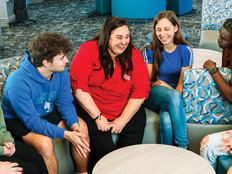Q&A: Jon Bergmann, Flipped Classroom Pioneer, Reflects on His Journey
The idea of turning education on its head is a romantic notion that many teachers fervently believe in at the onset of their careers. But battling against the precedents and built-in expectations of the teacher as lecturer is sometimes difficult to overcome.
That’s why the flipped classroom — the practice of creating lectures for independent study at home and using classroom time for discussion and collaboration — has been hailed as a kind of salvation for many educators.
While at ISTE 2013 in June, EdTech spoke with Jon Bergmann, a noted flipped classroom pioneer and author, who did not mince his words: “What’s the best use of your face-to-face class time? It’s not us standing in front of our kids and yakking at them.”
Recently, Bergmann, along with Aaron Sams, was nominated for the Brock International Prize in Education.
We caught up with Bergmann to get his take on the award nomination and the evolution of the flipped classroom model over the past few years.
EDTECH: Looking back, what were your most memorable successes and challenges in flipping your classroom as a teacher?
BERGMANN: I remember Annabelle, who came into my class her freshman year and appeared to just want to get by. School did not seem to be a priority for her, and I remember saying to myself, “Annabelle is not going to like this class.” I said this because the Flipped-Mastery course really expects all students to deeply learn and not just try and get by. As the year started, Annabelle was frustrated because she constantly took shortcuts to learning.
When she got to the summative assessments, she struggled to pass. Around January or February, I started to notice some remarkable improvement in her learning. She was not struggling with her summative assessments and was getting excited about learning. During one of my daily visits, I chatted with Annabelle and asked her what was going on. Her first comment was, “Mr. Bergmann, I have found it easier if I learn it right the first time.” What she was essentially telling me was that she was taking charge of her learning and that she was learning how to learn. She may forget the content of the course, but learning how to learn was a valuable tool she took away from my class that year.
The biggest challenge for us was dealing with grading when we transitioned to the Flipped-Mastery model. The idea of the Flipped-Mastery model is for students to progress at their own pace. But some students need to be given more direction. Though we came up with a system that worked, we were never completely satisfied with the method because it hurt those students who learned slower.
EDTECH: How has the idea of the flipped classroom evolved from its inception?
BERGMANN: Our biggest mistake when we started the flipped class was focusing too much on video creation. We made a video for every lesson. We felt that videos were the answer. As we grew and got input from countless others, we realized that the key to the flipped classroom was what happens during class time.
Rethinking and re-imagining what class time looks like is truly the most important part of the flipped classroom. When I share the flipped classroom with educators, I always ask one key question: “What is the best use of your face to face class time?” This question focuses educators on what really matters and helps move them from what I call Flipped Class 101 into the deeper flipped learning.
EDTECH: What's the biggest misconception people have about the flipped classroom approach?
BERGMANN: The biggest misconception is the way in which people have narrowly defined the flipped classroom. Many believe it is simply lecture at home and homework in class. Though this is where we started, and where many start, it should be a springboard to more. Teachers need to transition from the flipped class to deeper learning strategies. This, in fact, is the focus of our next book, where we challenge educators to not just settle for the flipped class, but to go deeper and take their students further.
EDTECH: What kind of feedback have you received since being nominated for the Brock International Prize?
BERGMANN: We have had a number of people congratulate us for the nomination. We are truly honored that we were chosen. The more important thing is not about us; rather, the thousands of students who are learning better and more deeply because of flipped learning.







